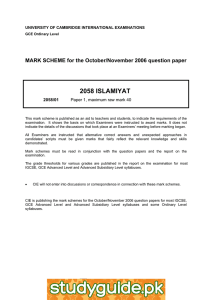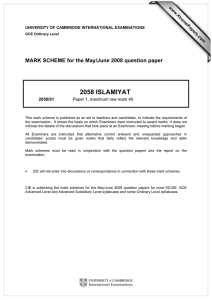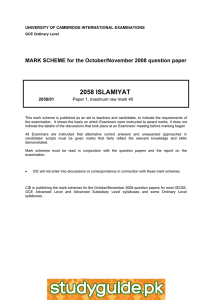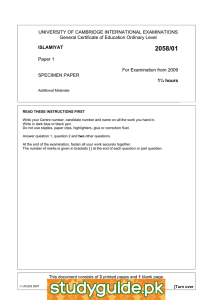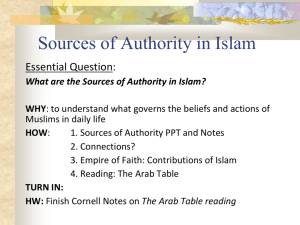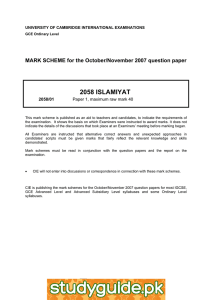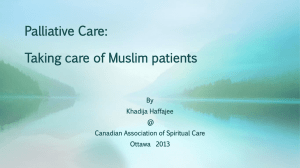2058 ISLAMIYAT MARK SCHEME for the October/November 2006 question paper
advertisement
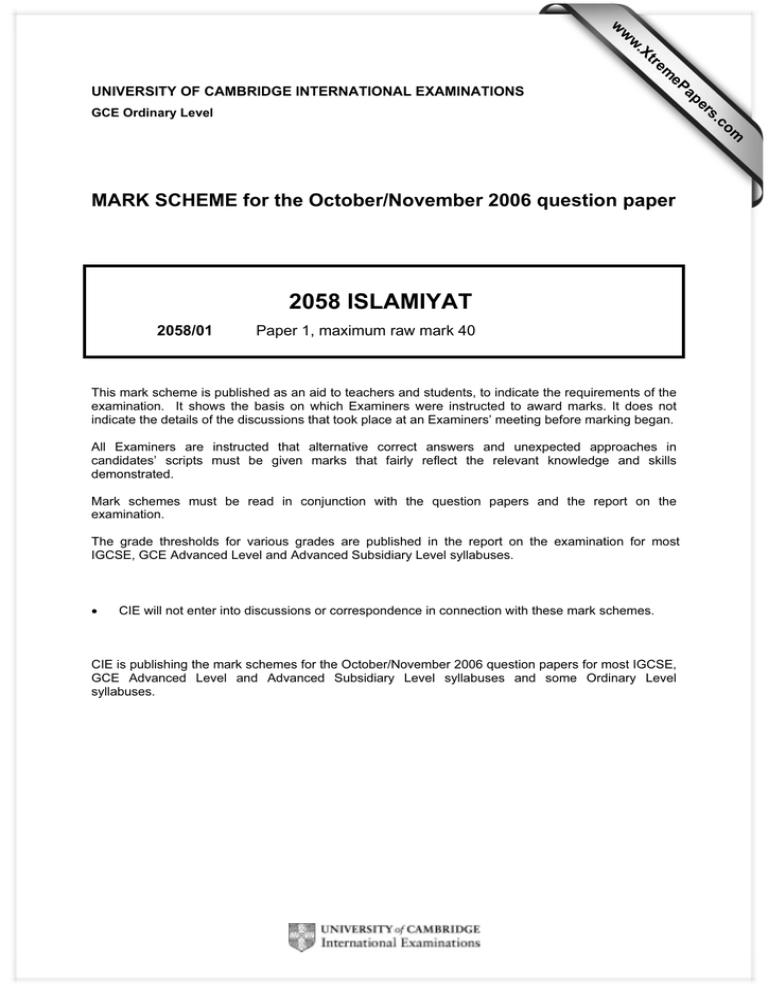
w w ap eP m e tr .X w UNIVERSITY OF CAMBRIDGE INTERNATIONAL EXAMINATIONS s er GCE Ordinary Level om .c MARK SCHEME for the October/November 2006 question paper 2058 ISLAMIYAT 2058/01 Paper 1, maximum raw mark 40 This mark scheme is published as an aid to teachers and students, to indicate the requirements of the examination. It shows the basis on which Examiners were instructed to award marks. It does not indicate the details of the discussions that took place at an Examiners’ meeting before marking began. All Examiners are instructed that alternative correct answers and unexpected approaches in candidates’ scripts must be given marks that fairly reflect the relevant knowledge and skills demonstrated. Mark schemes must be read in conjunction with the question papers and the report on the examination. The grade thresholds for various grades are published in the report on the examination for most IGCSE, GCE Advanced Level and Advanced Subsidiary Level syllabuses. • CIE will not enter into discussions or correspondence in connection with these mark schemes. CIE is publishing the mark schemes for the October/November 2006 question papers for most IGCSE, GCE Advanced Level and Advanced Subsidiary Level syllabuses and some Ordinary Level syllabuses. Page 2 Mark Scheme GCE O LEVEL - OCT/NOV 2006 Syllabus 2058 1. Comment on the main teachings contained in two of the following passages from the Qur'an. (a) Paper 01 [2 x 4] Sura 2.124-6 And remember that Abraham was tried by his Lord with certain commands which he fulfilled. He said: “I will make you an Imam to the people.” He pleaded: “And also from my offspring!” He answered: “But my promise is not within the reach of evildoers.” Remember we made the House a place of assembly for men and a place of safety; and take the Station of Abraham as a place of prayer; and we covenanted with Abraham and Isma`il, that they should sanctify my House, for those who compass it round, or use it as a retreat, or bow, or prostrate themselves. And remember Abraham said: “My Lord, Make this a city of peace, and feed its people with fruits – Such of them as believe in God and the last day.” He said: “And such as reject faith, For a while will I grant them their pleasure, But will soon drive them to the torment of fire – An evil destination.” • • • • • • (b) Sura 17.1 Glory to him who took his servant for a journey by night from the sacred mosque to the farthest mosque, whose precincts we blessed in order that we might show him some of our signs: for he is the one who hears and sees. • • • • • • (c) Ibrahim (and Isma`il) repaired (or built) the Ka`ba so it became a centre of prayer and religious reflection. Makka itself became a place where people could be secure. But the Makkans (and all believers) had to rely on faith and not their origins for salvation with God. This passage refers to the origins of the annual pilgrimage. Those who reject God’s call will be condemned to hell. Ibrahim was granted the significant position of imam (or leader/father) of the people. This sura demonstrates the power and majesty of God. The Prophet was taken from Makka to Jerusalem and back by night (Isra), Precisely from the Haram mosque at Makka to the Masjid al-Aqsa' at Jerusalem [both mosques must be named]. The verses are usually seen as also referring to the Prophet's ascension to heaven (Miraj). On the night journey he led the prophets in prayer. The verses explain why Makka and Jerusalem are central in Muslim spirituality. Sura 112 Say: He is God, the one; God, the Absolute. He does not beget nor is he begotten, And there is none like him. • • • • • The oneness of God is central to the Qur’an. It is also fundamental to Islam. God is unique and entirely self-subsistent; He is not physically related to children or parents. He cannot be compared with other beings or any other thing. © UCLES 2006 Page 3 2. (a) (b) Mark Scheme GCE O LEVEL - OCT/NOV 2006 Syllabus 2058 Paper 01 Outline four of the Prophet's personal qualities that make him a model for Muslims to follow.[4 x 3] Choosing two of these qualities, give one example in each case to show how Muslims can put them into practice in their own lives. [2 x 2] (a) [Look for four of the Prophet's qualities that can be a model for Muslims. Do not give marks for qualities unique to the Prophet, e.g. that he is a blessing for humankind. In each case award 1 mark for: • identification of the quality, • examples of how it was shown in the Prophet's life, • possible supporting quotations from the Hadith, Qur'an and remarks of his Companions.] (b) [In each case: Give 1 mark for the basic outline of a Muslim putting the chosen quality into practice. Give a further 1 mark for an example fully worked through.] © UCLES 2006 Page 4 3. (a) (b) Mark Scheme GCE O LEVEL - OCT/NOV 2006 Syllabus 2058 Paper 01 Describe the main characteristics of the congregational prayers on Friday. Explain the main differences between regular daily prayer (salat) and personal prayer (du`a'). [10] [6] (a) • • • • • • • • • • • • • All Muslim men in a community should try to gather for this prayer. In some communities women are also encouraged to attend. They should try to bath and put on fresh clothes / They perform ablutions before worship (purification). There are two adhaans for the congregational prayer. They should say the prayer together behind the Imam / the prayer can’t be prayer alone. The Imam preaches a sermon, which is compulsory to hear (there are 2 sermons). After a pause he preaches a second sermon. These sermons always consist of advice based on the Qur'an and Hadith about living a Muslim life. People should not speak or use mobiles during the sermon, and listen attentively. The fard are prayed in two rakats, not four. The prayer cannot be prayed kaza, or after the set time. Some people are exempt from Friday prayers, e.g. travellers, the sick, women and children. [Allow 1 mark for supporting quotations from Qur'an or Hadith.] • • • • • • • • • • Regular prayer is always performed according to the pattern set by Qur'an and Sunna. It is obligatory, whereas personal prayers are voluntary. It has set timings, whereas du`a' prayers can be performed at any time. It is directed towards the Ka`ba, It consists of set formulas and actions, but du`a’ prayers are not necessarily said according to a pattern. It is always in Arabic, but Du`a' prayers can be offered in any language. For regular prayers you need purification, but it is not obligatory for du`a’ prayers. Regular prayer is worship to God but du`a’ prayers comprise requests for oneself or others. They (personal prayers) are free, in that anyone or anything can be mentioned. They often consist of prayers spoken by the Prophet or, for Shi`is, Imams. (b) © UCLES 2006 Page 5 4. (a) (b) Mark Scheme GCE O LEVEL - OCT/NOV 2006 Syllabus 2058 Paper 01 Trace the major stages in the compilation of the Qur'an in the time of the caliphs Abu Bakr and `Uthman. Why did these caliphs think it was important to make a compilation of the Qur’an? [2 x 5] [6] (a) • • • • • • • Under Abu Bakr a number of memorisers were killed. This was at the battle of Yamama. `Umar suggested that the Qur'an should be written down for safety. Abu Bakr was reluctant because this had not been done under the Prophet. But a compilation was made. It eventually was given into the keeping of Hafsa. Zayd ibn Thabit was the chief scribe. • • • • • • • Under `Uthman it became known that different forms (dialects) of the Qur'an were being circulated. He ordered a single authoritative copy to be made. Zayd Ibn Thabit was given this responsibility. He was helped by a group of leading Muslims. `Uthman had four copies of this edition made and circulated these. He ordered all other versions to be destroyed. The official version was made in the dialect of Quraysh. • • Abu Bakr came to see that the Qur’an could not be kept in memories alone. Although the Prophet had not made a written compilation, Abu Bakr realised that this would have to be done if the authentic Qur’an was to be preserved. `Uthman realised that the original message might be lost. If different versions were allowed to exist the original meaning might no longer survive. Muslims would not have a single source of guidance. Rival interpretations might break the unity of the community. Only the original revelation given to the Prophet could preserve unity. (b) • • • • • © UCLES 2006
